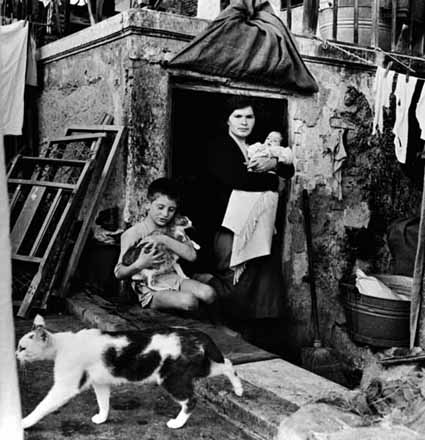|
Rome
The italian capital, where Pinna moved following
his family in 1935, determines a sense of continuity in the career of the
sardinian photographer. In Rome Pinna took part to the Resistance Movement
against the nazi-fascist occupation, making a first amateurish shot during
the entry of the allied troops in town. In Rome Pinna became a militant
of the Italian Communist Party and invented, after having directed the
photography of documentary film (Canto d'estate, direct by S.Ubezio
and P.L. Martinori), a blitz-photography strictly political, that
certainly was, as admitted by the same Tazio Secchiaroli, the forerunner
of the "paparazzismo".
|

|

 photographs
photographs
|
In Rome Pinna founded in 1952,
with De Martiis, Garrubba, Sansone e Volta, the cooperativa Fotografi
Associati. In Rome Pinna met Franco Cagnetta, founder with
Ernesto De Martino and Diego Carpitella of the Centro Etnografico Italiano,
who introduced him to the anthropological photography. Following Cagnetta,
in the spring of 1956, Pinna partecipated in a memorable survey on the
roman "borgate". Still in Rome, Pinna manteined his most important relations
with the italian press, first with the political reviews and with "Il Mondo",
later, in the early sixties, with "L'Espresso" and "Panorama". Always
in Rome, Pinna attended the cinematographic milieu, alternating
the activity as a reporter on the movies set ("Radiocorriere TV", "L'Espresso",
"Sunday Times", "Panorama"), to the proper set photoghrapher.
Culture, fashion, politics, young people, show biz, popular
habits, jobs, daylife and nightlife: a diary lasted thirty years, made
of powerful photos wich underlines the contrast of a city with a glamorous
past and a confusional present. Through Pinna's eyes the perfect portrait
of Rome, microcosme and paradigm of all postwar western capitals, facing
their crises, the lack of ethic values. |